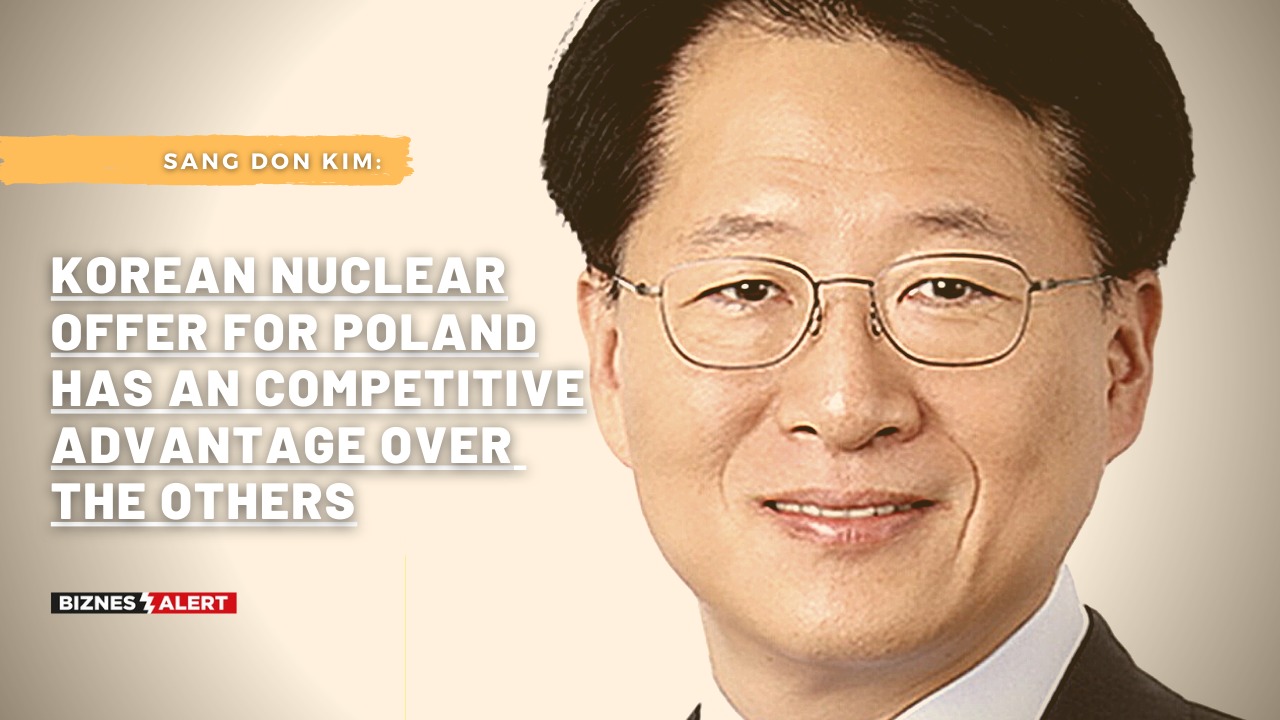I believe that most important factors that determines the success of nuclear power plant construction are the type of reactor that guarantees robust safety and ability to construct on time and within budget. As a trustworthy supplier KHNP has an competitive advantage over others in this respect and we believe the Polish government will make a reasonable decision – says Sang Don Kim, Executive Vice President of Business Growth Division at KHNP.
BiznesAlert.pl: What would be the role of KHNP in the Polish nuclear program? How could KHNP cooperate with other companies?
Sang Don Kim, KHNP: According to the Polish nuclear program it needs a third generation reactor and the Korean APR1400 flagship reactor meets all the requirements. Based on our advanced technology and robust level of safety we obtained approval for the APR 1400 from the European Utility Requirements (EUR) organization in 2017 and a Design Certification from the US Nuclear Regulatory Commission (NRC) in 2019. With this approval, technology provided by KHNP complies with key international requirements. The APR1400 is the fruitful result harvested by our longstanding construction effort and operation as well as our company values. Certified by EUR, the reactor features safety features, including passive safety systems, protection against large commercial plane crashes and cybersecurity. We have 50 years of experience with nuclear power plants (NPP) construction and an ability to build on time and within the budget. KHNP and Korean government have keen interest in Poland’s nuclear program and we are fully prepared to provide support through a financing solution and package solution with the government. KHNP organized conferences with Polish local business in 2018 and 2019. We are sparing no effort in providing a robust supply chain network through the possibility of cooperation with over 70 local companies in various sectors including Energoprojekt Warszawa and Katowice from the design and engineering sector, Polimex Mostostal from the construction sector, Elektrobudowa in the electric section and ZRE Katowice in mechanical sector.
How about long term cooperation. Are you planning to stay in Poland after you build the nuclear reactors?
From planning to construction it takes 10 years to construct a NPP. The APR1400 life cycle is 60 years. This means if the NPP is to be constructed there will be coordination in a wide range of sectors in the region and variety of industries. Take the UAE for example. We have expanded our cooperation beyond the nuclear industry. Our government promoted defense industry cooperation and cultural exchange. Looking at the nature of the nuclear industry, I believe that cooperation can be continued for a very long period – from 70 years to more than a 100 years.
What would be the role of KHNP in training nuclear staff in Poland?
Operating a NPP requires a highly skilled workforce. In this regard training and cultivating a skilled workforce is very important. The Human Resource Development program needs to implement staff training initiatives at the early stage of development. Companies and academics need to implement such programs. Korea has put enormous effort in developing its human resource program with our first NPP’s. It also had major importance when implementing a project like the UAE’s Barakah power plant. KHNP and the nuclear industry in Korea has grown strong ties with Polish academic institutions. We signed several MoUs with prestigious universities in Poland: University of Warsaw, Warsaw University of Technology, AGH University of Science and Technology to cooperate in a wide range of areas such as joint research and student exchange. Building upon such cooperation we organized a HRD seminar between Korea and Poland on 4th of February with several parties, including the Ministry of Climate and Environment, National Atomic Energy Agency, PGE, and others. This seminar not only served as an opportunity to share information on each other’s interesting training programs but also to bolster ties in the education sector. We look forward for further cooperation of this kind in the foreseeable future.
What could be the involvement of KHNP in the financing scheme of the Polish nuclear power plant? There are talks with Americans and French. Do you want to challenge their proposal or could you cooperate with them?
We fully understand the importance of financing of NPP. Keeping this in mind, KHNP plans to provide a reasonable financing solution that suits the needs of the Polish nuclear program in consideration of all OECD guidelines. We understand that Poland wishes a level of 49 percent participation from the supplier. Through cooperation between the Korean government, ECA, and global financing institutions we can provide the financing scheme that suits the Poland’s needs and we are ready to have an discussion with Polish authorities in regard of financing model that meets our common interests. However, when it comes to the financing solution there are many issues to be addressed and discussed. Therefore we hope to have an in depth discussion with Polish government and companies down the road.
Lastly, I would like to thank you for the opportunity to communicate with stakeholders in Poland. I truly believe we have mutual respect for our industry and culture. Through the years of our friendship we naturally developed our interest toward Polish nuclear power plant construction with your country recently deciding to build and deploy nuclear power. I have every conviction that the NPP project could serve as a foundation for further development of our strategic relations. I believe that the most important factors that determine the success of nuclear power plant construction are the type of reactor that guarantees robust safety and the ability to construct on time and within budget. As a trustworthy supplier, KHNP has a competitive advantage over others in this respect and we believe the Polish government will make a reasonable decision.
Interview by Wojciech Jakóbik









